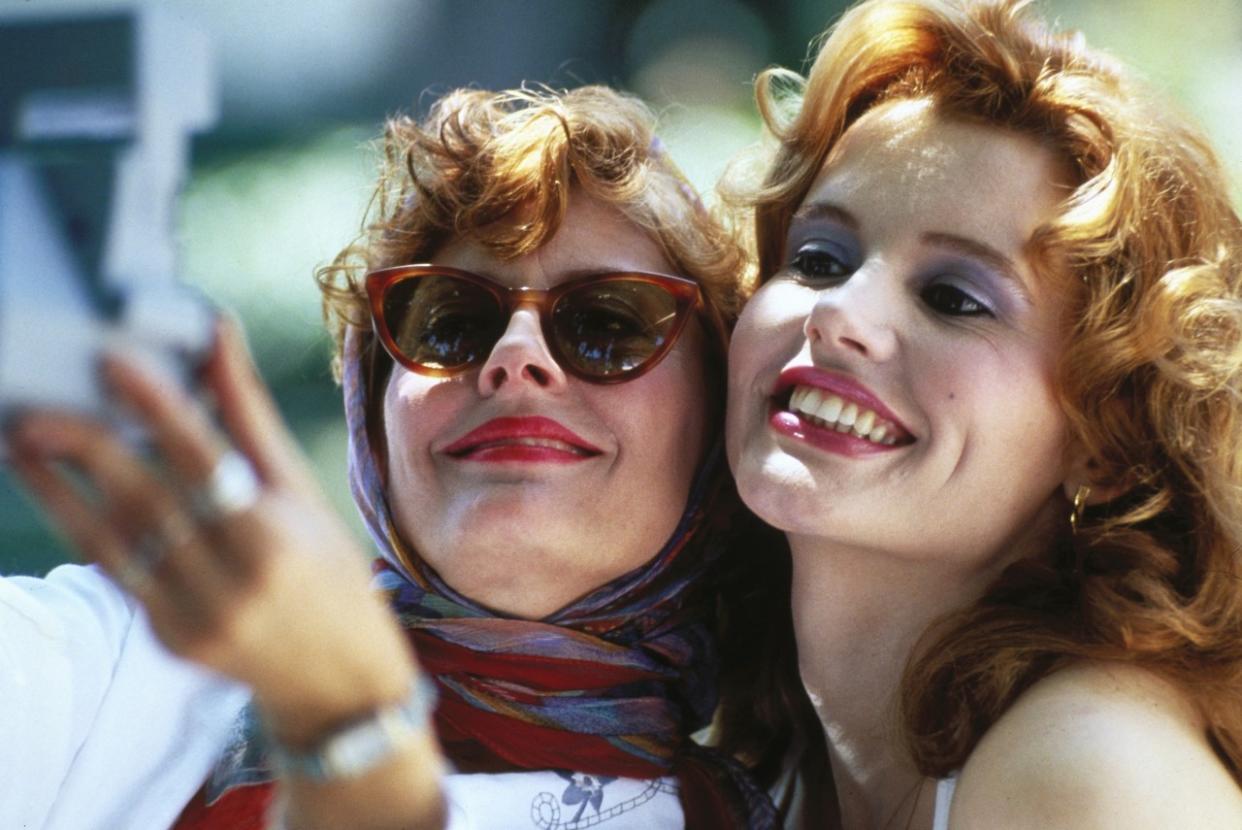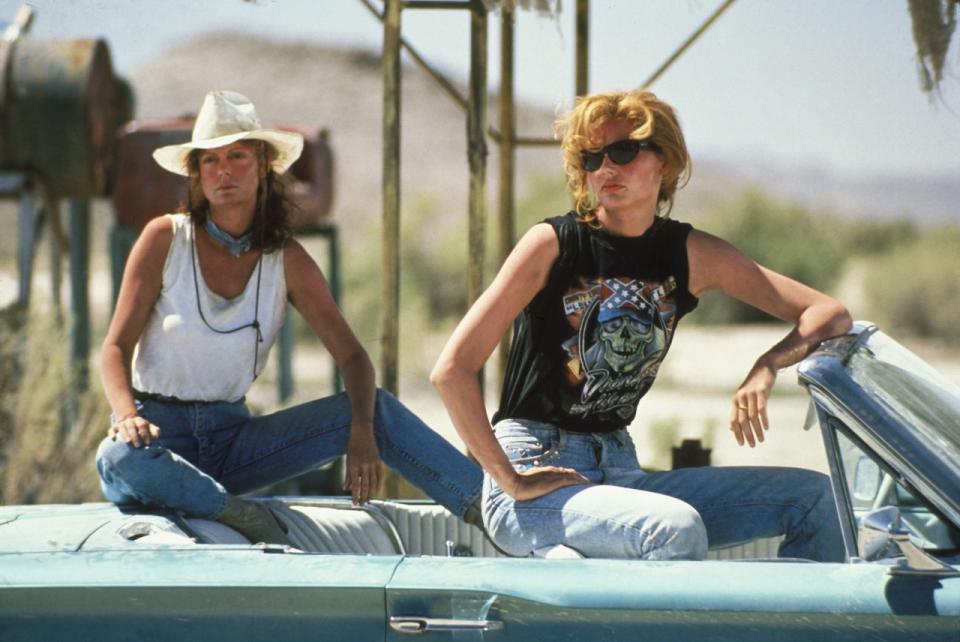‘Thelma & Louise’ at 25: In 1991, A Mix of Rave Reviews and Critics Sent Over the Edge

Susan Sarandon and Geena Davis in 1991′s ‘Thelma and Louise’ (Everett Collection)
So, you think the new version of Ghostbusters launched a nasty debate about gender politics in popular culture? Consider the firestorm kicked off 25 years ago today, long before instant vitriol on social media became a fact of life, when moviegoers first met Thelma & Louise on May 24, 1991.
Ridley Scott’s film, from Callie Khouri’s script, stars Geena Davis and Susan Sarandon as two friends whose empowering road trip takes a dramatic turn after Louise (Sarandon) kills a man attempting to rape Thelma (Davis). It was a modest sleeper hit upon release, eventually was nominated for six Oscars, and maintains a fan base a quarter century later. It won the approval of many critics in 1991, but acclaim certainly was not universal. In fact, the film’s feminist message sent a few critics over the edge. Here’s a look back at the divided contemporary verdicts on the film as it celebrates its milestone anniversary today.
Related: 25 Years After ‘Thelma & Louise,’ Geena Davis Says She Wanted the Susan Sarandon Role
Janet Maslin of The New York Times was perhaps the most enthusiastic, writing that the film “reimagines the buddy film with such freshness and vigor that the genre seems positively new. It discovers unexpected resources in both its stars, Susan Sarandon and Geena Davis, who are perfectly teamed as the spirited and original title characters.”
‘Thelma and Louise’: Watch the trailer:
Hollywood bible Variety also raved, and attempted to play down the more controversial elements. “Despite some delectably funny scenes between the sexes,” an uncredited Variety staffer wrote, “Ridley Scott’s pic isn’t about women vs. men. It’s about freedom, like any good road picture. In that sense, and in many others, it’s a classic.”
Ralph Novak in People couldn’t have disagreed more, and he wrote one of the more obviously pearl-clutching responses that saw it bluntly as male-bashing: “Any movie that went as far out of its way to trash women as this female chauvinist sow of a film does to trash men would be universally, and justifiably, condemned.”
John Leo in U.S. News and World Report, in a widely discussed column that came to symbolize the negative view of the film (unfortunately, the essay itself does not appear to be online now), detected “an explicit fascist theme, wedded to the bleakest form of feminism” and a “paean to transformative violence."

Sarandon and Davis in ‘Thelma & Louise’ (Everett Collection)
Julie Salamon in the Wall Street Journal objected that the heroines’ responses on screen are “so disproportionate to the men’s ‘crimes’ that Thelma and Louise come off not as victims but as the worst kind of bullies.” And Newsday’s Liz Smith declared that “They are horrible role models. I wouldn’t send any impressionable young woman I know to see Thelma & Louise.”
Gender politics wasn’t the only thing on critics’ minds, though. Clifford Terry in the Chicago Tribune took issue with Scott’s filmmaking approach: “Whereas the material begs for the off-stride touch of a Jonathan Demme, it is sabotaged by Scott, who seems to have little affinity for whimsy; instead, he resorts to the by-now-cliched barrage of hard-driving ‘traveling music’ as well as periodic sun-dappled close-ups of ‘crusty’ Western faces.”
Roger Ebert in the Chicago Sun-Times was more complimentary to Scott, though, writing the director “helps us to understand what’s going on inside the hearts of these two women—why they need to do what they do,” though the execution of the film’s final shot bothered him so much, he wrote, he reduced his rating to 3 ½ stars from 4 because of it.
‘Thelma & Louise’: Watch the shocking final scene:
In a subsequent essay following up on his review, Ebert directly challenged Novak’s view that women on screen would never be subjected to the kind of treatment received by men in Thelma & Louise: “Men have been making victims out of women in hundreds of movies for years. It’s an old story in our society: Oppressive behavior is permitted from the oppressor class, but becomes offensive if practiced by the formerly oppressed.”
Today, many of the more vociferously, misandry-decrying reviews feel like they were reacting against exactly what thrilled women in audiences. As Gary Thompson in the Philadelphia Daily News wrote, “There’s something to be said for seeing Geena Davis and Susan Sarandon in a movie like this, aside from the fact that neither one is Sylvester Stallone. They give this tired genre a much-needed lift.”
Related: Geena Davis on Hollywood Sexism: ‘Nothing Changed’ After ‘Thelma & Louise’
It felt at the time like an exciting game-changer. Unfortunately, 25 years later, feature films that tell women’s stories are still notoriously difficult to get made, a point not lost on the film’s stars, though studios lately have at least slowly begun to embrace female leads in big-budget genre movies like The Hunger Games, Star Wars: The Force Awakens, and yes, Ghostbusters. Those films attract their own detractors. But as Clarence Page of the Chicago Tribune wrote in an essay about the reaction to Thelma & Louise, “I am most amused to see white men overreacting to this film’s unflattering portrayal of white men… Some of us can’t bear to see our worst sides portrayed on the screen without getting our wid-dow feel-wings hurt.”
‘Thelma and Louise’: Watch Susan Sarandon join James Corden on ‘The Late Late Show’ to create three alternate endings for the film:

